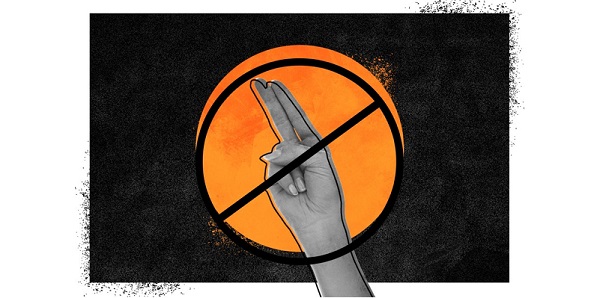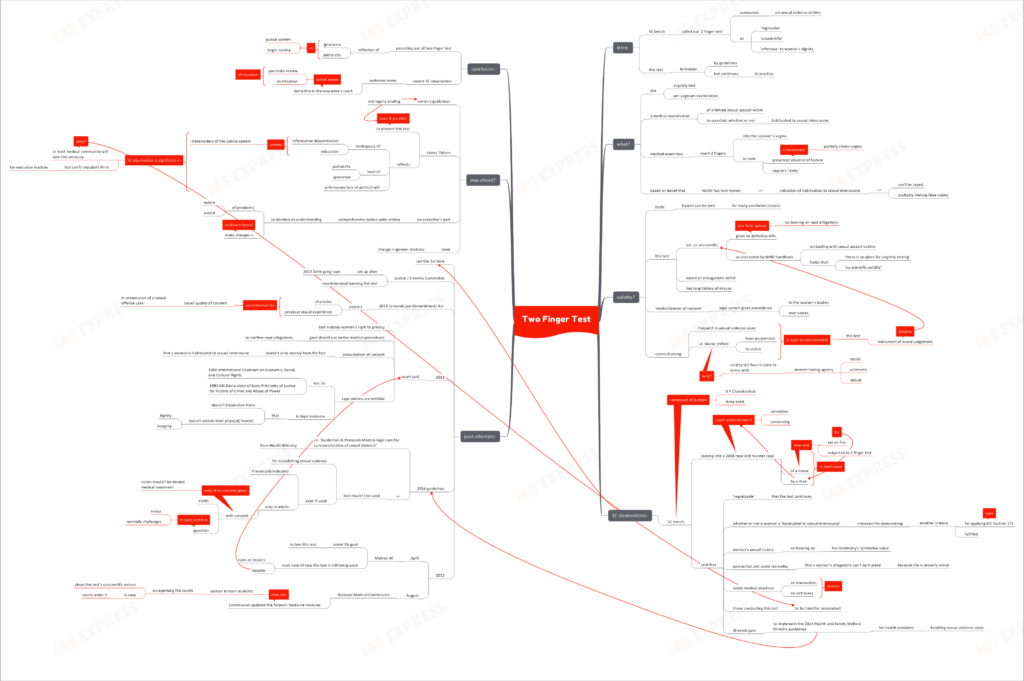Two Finger Test- Getting Rid of a Regressive Practice

Recently, a Supreme Court bench called out the so-called ‘two-finger test’, conducted on sexual violence victims, as ‘regressive’, ‘unscientific’ and ‘offensive’ to women’s dignity. Though this ‘test’ is forbidden by guidelines, it continues in practice.

This topic of “Two Finger Test- Getting Rid of a Regressive Practice” is important from the perspective of the UPSC IAS Examination, which falls under General Studies Portion.
What is the Two Finger Test?
- The two-finger test or the virginity test or per-vaginum examination is a medical examination of a female sexual assault victim to ascertain whether or not she is habituated to sexual intercourse.
- In this test, the medical examiners insert their 2 fingers into the survivor’s vagina to note the presence/ absence of hymen (a membrane that partially closes the vagina) and the vagina’s ‘laxity’.
- The test is based on the belief that if the victim has torn hymen, it is an indication of habituation to sexual intercourse and hence, cannot be raped/ is probably making false claims about being raped.
How valid is this test?
- However, the truth is a hymen can be torn for many unrelated reasons. Yet, the test, along with its misogynistic belief, continues in practice, with a long history of misuse.
- This test is established as unscientific and it doesn’t provide any definitive information either. Moreover, any ‘information’ gathered from this intrusive test has no bearing on rape allegations.
- Notably, a WHO handbook on dealing with sexual assault victims holds that ‘there is no place for virginity testing’ and it has ‘no scientific validity’.
- This test is being termed as ‘medicalization of consent’ i.e. the legal system gives precedence to the women’s bodies, rather than their voices.
- Victim shaming is a frequent accompaniment to sexual violence cases in a society that is yet to come to terms with women having agency, be it social, economic or sexual. This often shifts the blame on to the victim, for the perpetrator’s transgressions.
- In such an environment, this test is functioning as an instrument of moral judgement to asses the truth of the victim’s claims, despite its established lack of scientific backing.
What is the court’s recent observation?
- Recently, the bench of Justice D Y Chandrachud and Justice Hima Kohli made observations on this test, while looking into a 2004 rape and murder case. In this case, a minor girl was raped and set on fire by a man in Jharkhand. The victim was subjected to the two finger test, later in the hospital. The bench restored the accused’s conviction and sentencing.
- The bench said that it was ‘regrettable’ that the practice still continues and that whether or not a woman is ‘habituated to sexual intercourse’ is irrelevant for determining whether criteria for applying IPC Section 375 (section dealing with rape) are fulfilled in a particular case.
- The bench added that a woman’s sexual history has no bearing on her testimony’s ‘probative value’. It noted the patriarchal and sexist mentality in thinking that a woman’s allegations can’t be trusted, simply because she is sexually active.
- The court said that such sexist medical practices only re-traumatizes and re-victimizes the survivors.
- The court also announced that those conducting this test on alleged rape victims will be tried for misconduct.
- It directed the union and state governments to implement the 2014 Health and Family Welfare Ministry guidelines for health providers handling sexual violence cases.
Have there been past attempts like this?
- This isn’t the 1st time the court is expressing disapproval with this test.
- The Justice J S Verma Committee, set up in the aftermath of the horrific 2012 Delhi gang rape incident, recommended banning the test.
- The 2013 Criminal Law (Amendment) Act says that a victim’s character and her previous sexual experience have no relevance for the issue/ quality of consent in the prosecution of a sexual offence case.
- In 2013, the top court held that the test violates women’s right to privacy. It directed the government to use better medical procedures to confirm rape allegations.
- A bench, of Justices BS Chauhan and FMI Kalifulla, held that a presumption of consent doesn’t arise merely from the fact that a woman is habituated to sexual intercourse.
- The apex court, invoking the provisions of the 1966 International Covenant on Economic, Social, and Cultural Rights and the 1985 UN Declaration of Basic Principles of Justice for Victims of Crime and Abuse of Power, said that rape victims are entitled to legal recourse that doesn’t traumatize them nor violate their physical/ mental dignity and integrity.
- In 2014, the Health Ministry put out the ‘Guidelines & Protocols Medico-legal care for survivors/victims of sexual violence’.
- It clearly states that this test mustn’t be used for establishing sexual violence.
- Even if its use is medically indicated, it can be done only in adult victims.
- Such examinations too require the consent of the victim/ her guardian (in case she is a minor/ mentally challenges).
- Even if the victim doesn’t consent to the test, she can’t be denied medical treatment.
- In April 2022, the Madras High Court asked the Tamil Nadu state government to ban this test. The bench took note of how the test is still being used, even on minors, despite the 2013 SC judgement.
- In August 2022, the top medical education regulator, National Medical Commission updated the forensic medicine modules with reference to this test. It includes a section to train students on apprising the courts about the test’s unscientific nature, in case the court orders it.
What is the way ahead?
- Though the center has guidelines in place to forbid the test’s use, note that it isn’t legally binding.
- The failure of the states to prevent this test reflects the inadequacy of information dissemination and education among the stakeholders of the justice system. It also points to the level of patriarchy and ignorance.
- The fact that this regressive and ignorant practice persists nearly 8 years after the 2014 guidelines is an indication of the unfortunate lack of political will.
- In this context, the court’s recent observation acquires significance. At the very least, the medical community will start taking the issue more seriously.
- The recent observation, though a welcome measure, is only a restatement of its earlier position on the issue. The judiciary can’t, and shouldn’t fill in for inaction from the executive’s part.
- The executive needs to undertake a comprehensive nation-wide review to develop an understanding of the extent and nature of the problem. Any changes that follow this should be evidence-based.
- The case of the prevailing two finger test is a lesson on how stringent legislature alone is insufficient for fixing the broken system. It needs to be accompanied by change in gender relations.
Conclusion:
The persisting use of two finger test is a reflection of the level of ignorance and patriarchy in the justice system and the society at large. The recent SC observation on the issue is a welcome move, however, the ball is in the executive’s court. A pan-India review and rectification of the situation is vital.
Practice Question for Mains:
In light of the recent Supreme Court observation on the two finger test, discuss why this outdated and intrusive practice continues despite guidelines forbidding it. What can be done to prevent its use? (250 words)

